Moxie: Your Friends Can Save Your Life
Jul 08, 2025ONE STORY
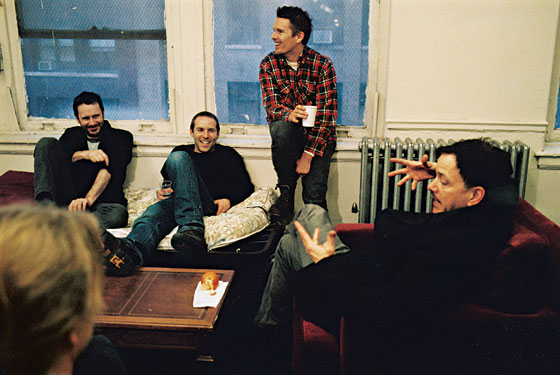
(Ethan Hawke with Josh Hamilton, Alessandro Nivola, and Frank Whaley. Photo by Cass Bird.)
"Your Friends Can Save Your Life"
Good Friends > Fame & Fortune
Ethan Hawke has been famous for over 30 years.
And perhaps the most important thing he’s ever said has nothing to do with film, theater, or acting. It’s this:
“I think your friends can save your life.”
He doesn’t mean that metaphorically. He means it literally.
When Hawke was 18, he starred in Dead Poets Society. The movie was a massive hit and launched him into instant acclaim. He experienced the kind of fame that breaks most people wide open.
And for a while, he chased it.
He took the meetings. Made the movies. Played the part.
But Hollywood has a short memory.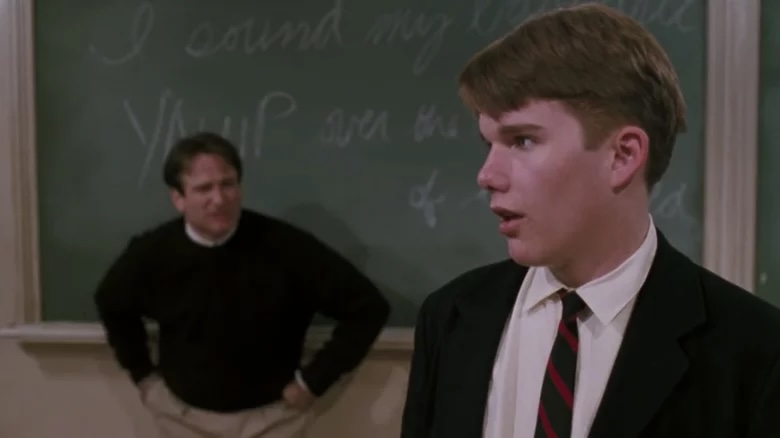
(Ethan Hawke in "Dead Poets Society". Photo courtesy of Touchtone Pictures.)
A few years later, after a string of box office flops, Hawke overheard a studio executive say,
“America cast its vote for Ethan Hawke. He’s not a movie star. He’ll never make it as an actor.”
That kind of thing messes with you.
And it would have swallowed him, if not for his friends.
Hawke didn’t just lean on his friends during this time.
He built with them.
In 1991, he used his own money to start a small theater company in New York called Malaparte with people he trusted: Josh Charles, Robert Sean Leonard, Steve Zahn.
They weren’t chasing status.
They were creating space.
Their goal was simple:
Be honest. Do the work. Stay human.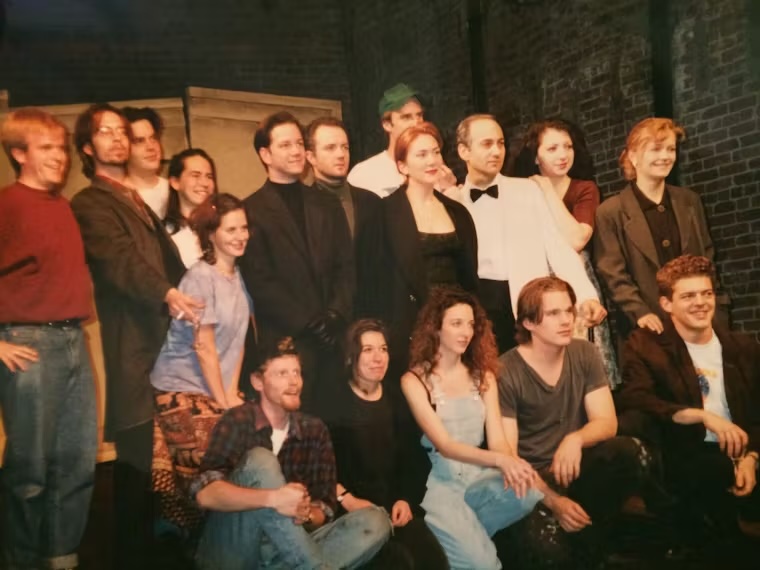
(The Malaparte Theater Company, 1994. Courtesy of Jason Blum.)
And when Hawke’s ego started to inflate? His friends brought him back down to earth.
“They’d say, ‘You sound stuck up. You’ve been doing too many interviews. You sound like your agent.’”
And they meant it with love. The kind of love that tells the truth.
The kind that pulls you back when you drift too far.
“Sometimes I just feel so lucky about the friends I made. They’re the ones who kept me alive and kept me thinking.”
Hawke didn’t become who he is by chasing the spotlight or perfecting his craft in isolation. He became who he is by staying close to people who helped him stay honest.
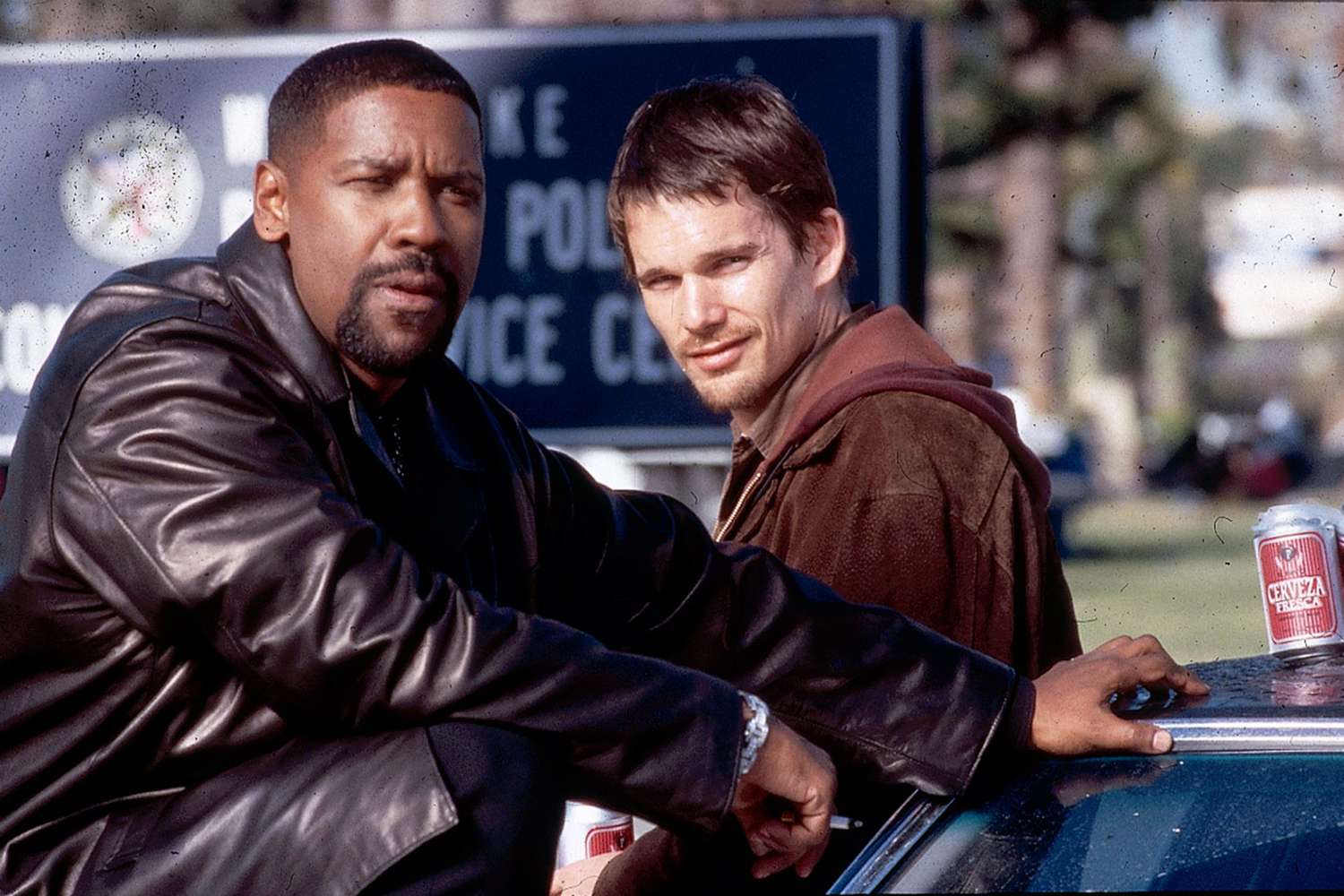 (Ethan Hawke with Denzel Washington in 'Training Day', 2001)
(Ethan Hawke with Denzel Washington in 'Training Day', 2001)
Ethan Hawke isn’t the only one who credits his friends with saving his life.
Fame & Friendship
Michael Phelps said it was a couple close friends who weren’t impressed by his medals who pulled him back from the edge during his darkest depression. One of them confronted him after a DUI arrest and helped convince him to go to rehab, a turning point that saved his life.
Serena Williams often speaks about her childhood friends and close-knit family group as a source of emotional protection. After her health crisis during childbirth and the public backlash that followed the 2018 U.S. Open final, it wasn’t her endorsements or fans that helped her heal; it was a tight group of “day one” friends who protected her private self from the noise.
Roger Federer has leaned for decades on a core group of childhood friends who traveled with him not to manage his brand, but to keep him grounded. They rotated in and out of his player’s box, offering laughter, perspective, and a reminder that he’s more than a scoreline.
Giannis Antetokounmpo surrounds himself with family and lifelong friends who remind him who he is, not what he’s worth. He’s said multiple times, “If I lose everything tomorrow, I’ll still have them. That’s what matters.”
Brené Brown keeps what she calls a “Square Squad,” a one-inch square of paper with the names of people whose opinions actually matter to her. These are the people she calls when she’s afraid, ashamed, or uncertain, and the ones who call her out when she’s drifting from her values.
Chance the Rapper still leans on high school friends who “don’t clap for the wrong things.” One close friend, who works in the nonprofit world, helps him make career decisions rooted in purpose, not ego or optics.
Different fields. Same thread. The higher the platform, the more vital the people who know you for who you are, not just what you’ve accomplished.
Friendship & The Brain
It turns out this kind of friendship feels life-giving, because it is.
When you’re around someone you deeply trust, your nervous system recognizes the safety before your mind even does.
The amygdala, your brain’s alarm system, begins to quiet. You stop scanning for threats. Your body releases oxytocin, the chemical that builds trust and softens fear. Heart rate slows. Cortisol, the stress hormone, drops.
You shift from vigilance to presence. From armor to openness.
That shift unlocks higher-order thinking. With the fear circuitry offline, your prefrontal cortex becomes more active. This is the part of the brain responsible for reflection, empathy, long-term decision making, and meaning.
You start to process emotions with more clarity. You become less reactive and more curious. More flexible. More kind to yourself.
Mirror neurons fire in rhythm with the person in front of you, allowing you to attune to their experience as if it were your own. This shared emotional space deepens connection.
It’s why a friend’s steady tone can regulate your breathing. Why their laughter can lift you out of despair. Why a quiet "I get it" from someone who knows you well can feel like medicine.
Being with close friends doesn’t just help you feel better. It literally rewires your brain to recover, to grow, and to stay anchored.
These relationships return you to yourself. They make healing possible. And in the long run, they don’t just keep you sane.
They keep you human.
📜 TWO QUOTES
"A friend is someone who knows the song in your heart and can sing it back to you when you have forgotten the words."
— C.S. Lewis
“We are not ourselves without each other.”
— Jean-Paul Sartre
🚀 THREE TAKEAWAYS
1. Real friends don’t flatter you. They return you to yourself. They reflect back the real you, even when it’s uncomfortable. They see through your polished answers and performance voice. That kind of truth is rare and necessary.
2. You don’t rise alone. And if you try to, you’ll fall hard. Every high performer is carried by people who ground them, challenge them, and walk with them through the doubt. When you try to outrun your need for connection, you eventually lose your grip.
3. Community isn’t optional. It’s survival. Your nervous system is wired for belonging. Without meaningful, trusted relationships, your brain lives in defense mode. But with the right people, everything changes. You regulate better. Think clearer. Heal faster. Grow deeper.
🔍 MOXIE REFLECTIONS
- Who are the people in your life who tell you the truth, even when you don’t want to hear it? When was the last time you listened?
-
What version of yourself do your friends bring out that you need more of right now?
-
Who have you surrounded yourself with? People who like you, benefit from you, and/or people who actually know you?
🛠️ TOOLS FOR GROWTH
🧩 PATTERN RECOGNITION: Illusion of Invulnerability
Early success can trick you into thinking you’re untouchable. You start to believe your instincts are always right, your momentum will last forever, and nothing can shake you.
Why it matters: This illusion makes you ignore warning signs, isolate from feedback, and push ahead without the grounding of honest relationships. It creates a false sense of security, right before the fall.
What to remember: No one is immune to struggle. Confidence without humility isn’t strength; it’s fragility in disguise.
The goal isn’t to feel invincible. It’s to stay anchored, especially when things are going well.
🧠 MENTAL SKILL OF THE WEEK: Relational Anchoring
Relational Anchoring is the ability to stay grounded in who you are by staying close to the people who know the real you. It shifts your focus from “Am I performing well enough?” to “Am I still showing up as myself?”
How to use it: Before the big meeting, big move, or big win, check in with someone who sees through the noise. Ask: Do I still sound like me? Do I still feel like me?
Let their presence return you, not to who the world wants, but to who you are when no one’s watching. This isn’t sentimentality. It’s survival. You don’t need more feedback to find your footing. You need a friend who tells the truth.
🌱 ONE MORE THING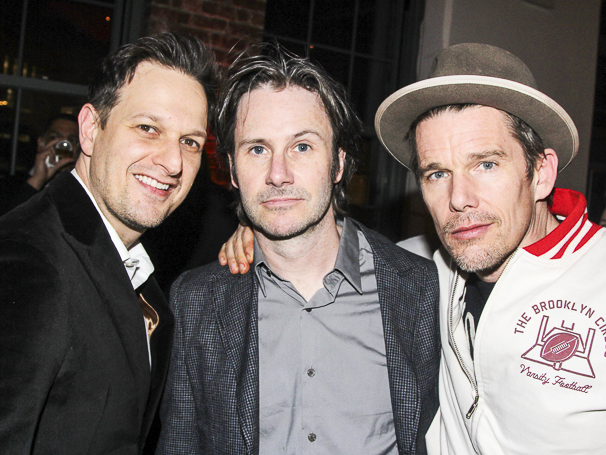
(Josh Charles, Josh Hamilton and Ethan Hawke. Photo courtesy of Broadway.com.)
Your friends can save your life.
What’s the point of getting “there” if there’s no one left to share it with? Or worse, if you’re no longer there, having slowly traded your soul to become someone else.
As you build whatever it is you’re building, stay true to who you are. And maybe the best way to do that…is to stay true to the ones who knew you before any of this began.

